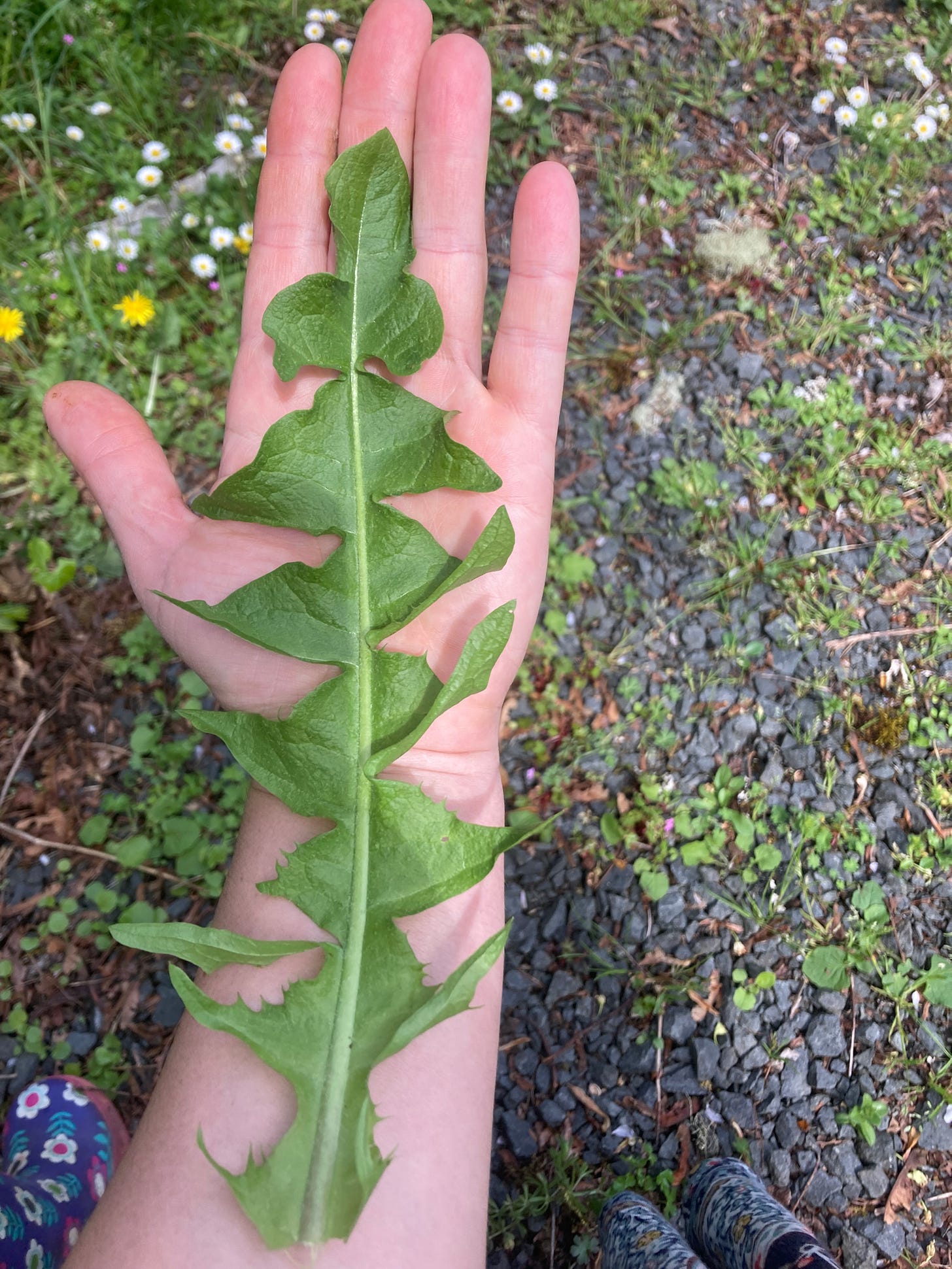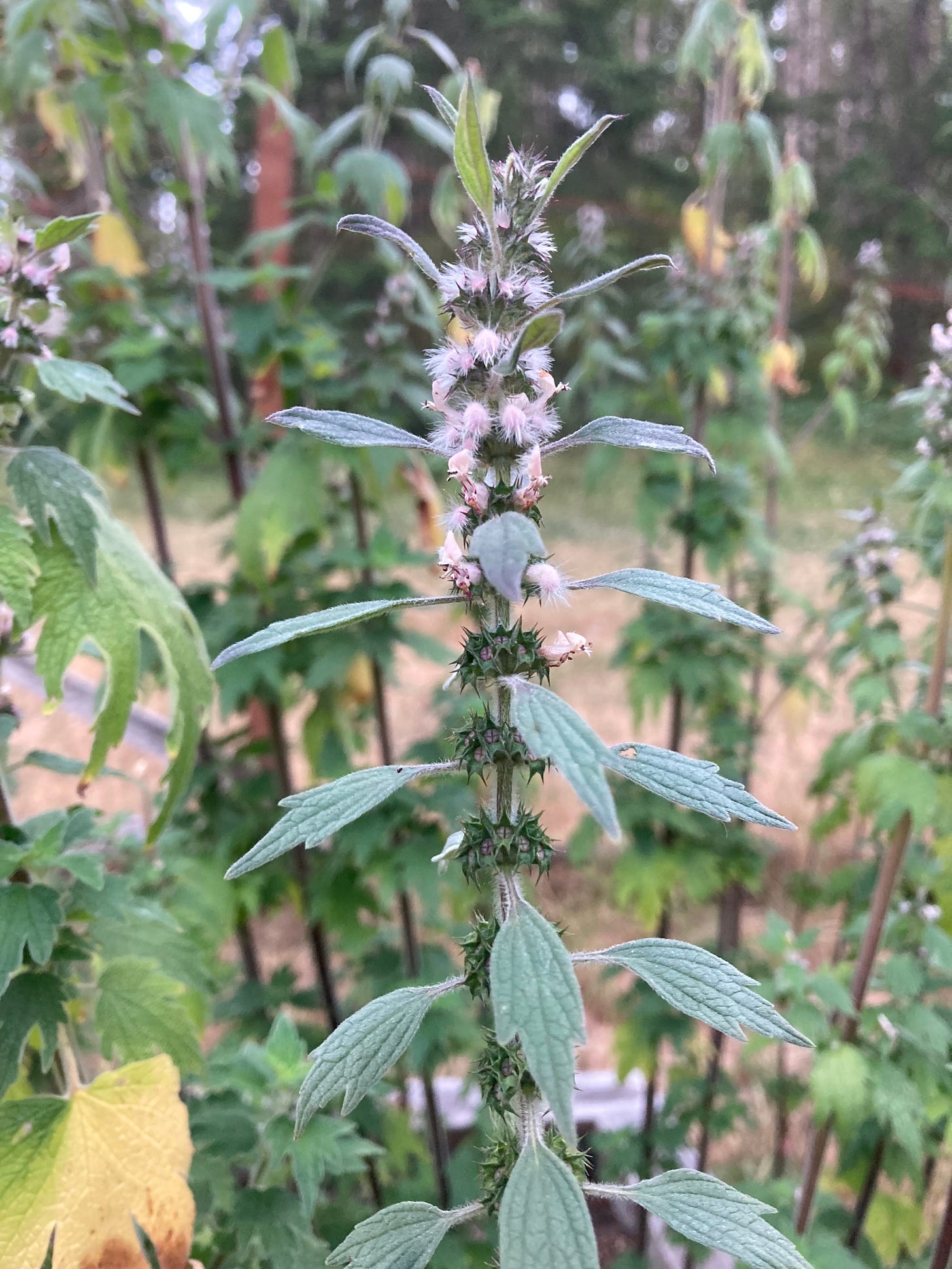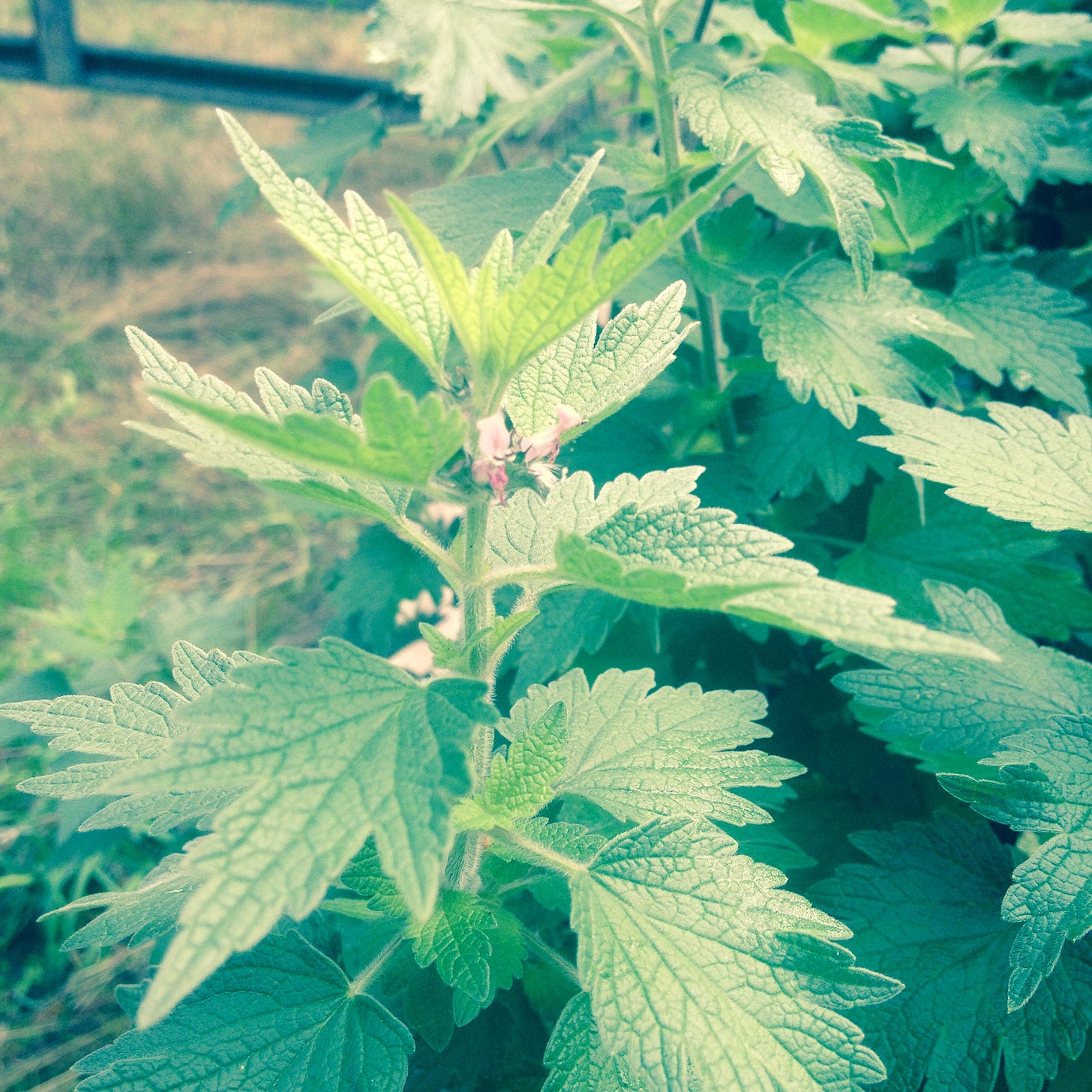Spirit of the Lion
Connecting the gut with the heart with two favorite medicinal herbs: Motherwort and Dandelion
Two wonderful herbs that I keep at all times in my herbal medicine chest are dandelion and motherwort. Dandelion, taraxicum officinale, also known as dent de Leon, means the lion’s tooth. And motherwort is known as leonurus cardiaca, the lion-hearted herb. These two herbs are not related in any way; however, both contain a reference to the lion in their name. For this reason, I wanted to explore these two powerhouse plants together.

Dandelion belongs to the Asteraceae family, which includes sunflowers and echinacea and many other plants, including many favorite medicinal species. Dandelion grows nearly everywhere, whether in a garden or open fields. It prefers sunny environments, and temperate weather. Most people can identify it by the yellow flower that usually blooms during April and May but can continue year-round if mowed. It has a notable leaf with serrated edges like the lion's tooth, which are hairless. There are some dandelion look-alikes, but they tend to have little hairs on the leaves. And it has the single stalk with flour that then turns into the seed ball with the many, many, many dispersible seeds attached to kind of fluff, which is the child's favorite game blowing the dandelion seeds out into the air.
Red stemmed or “Italian dandelion” is interchangeable with the other variety
Of its many special powers, one is its affinity for the liver. Dandelion is an amazing liver tonic and nourisher. It helps strengthen the liver and helps it with all its functions, which includes identifying and breaking down everything that comes through the bloodstream. The liver is a constantly busy organ. It is pulling apart hormones into their original pieces, sending waste to the kidneys to be eliminated through the bladder, and storing vital minerals and vitamins such as vitamin K and A.
Having a healthy liver is essential to good health, especially good digestion. We're really doing a lot for our health and for our wellbeing when we nourish our liver. Dandelion helps improves digestion by increasing the amount of hydrochloric acid in the stomach, one of the main digestive juices sloshing around in our stomachs to break down our food. It's very important that it's strong, and people who suffer from acid reflux tend, in fact, to have lower levels of hydrochloric acid in their stomachs. When food enters the stomach, acid reflux is caused because the stomach is working and working in order to break down the food that has entered, and the lack of strength of the hydrochloric acid is actually creating that kind of splash back effect and causes the heartburn and other symptoms. By taking some dandelion root tincture about 10 minutes before eating, it prepares the stomach for digestion, which, of course, trickles down into the other organs involved such as the liver.
Bees love collecting nectar from dandelion, that’s a good time for us to collect the flowers as well.
All parts of the dandelion are edible and can be dug up at any time of year.
The root can be cleaned, chopped up and turned into a tincture by pouring 100 proof vodka over a full jar and allowed to sit for 6 weeks. Similarly, one can pour apple cider vinegar over dandelion root, for a tasty and medicinal condiment.
The leaves can be chopped and sauteed. The flowers are edible and can be made into Dandelion Wine or infused in oil be used topically. This also has many benefits for sore muscles, and sore emotions that are affecting our physical being. Sometimes, when we are able to release tension in the body, we're able to release difficult emotions, difficult experiences that are kind of still ping ponging their way around our being. Infused oil or tallow of dandelion flower does just this. Another of my favorites is what I call dandelion pickle. I learned this from Eaglesong Gardener an amazing herbalist from Washington state. Simply dig up an entire dandelion plant at any time in its growing season. Chop it up finely, put it in a jar, pour apple cider vinegar over it, and you have this beautiful condiment and that can be used just to sprinkle on your food.
Dandelion also has a special superpower, which is that it contains high levels of potassium and is also a diuretic. I've heard that folks who might take a diuretic due to perhaps heart issues, like a high blood pressure, are often put on a diuretic that deplete the body of potassium. However, dandelion seems to be able to do both. It both works as a diuretic and has plenty of potassium to supplement the body for any losses of potassium it might experience due to the diuretic effects. This could potentially eliminate the need for a pharmaceutical diuretic, which people often then are prescribed or suggested that they take potassium supplements. I found that very interesting. I learned that from Doug Elliot, the folks singing herbalist.
Dandelion leaves are largest in June-July
Last but not least, dandelion is also a beautifying herb. Make a tea from a handful of the fresh dandelion flowers and then take those flowers and place them on the face for a nature's made facial mask that can smooth and refresh the skin and reduce splotches or unwanted coloration. For in depth information on dandelion and lots of recipes check Susan Weed’s healing Wise Book, where she has an entire chapter on dandelion medicine. It's an amazing resource for all things dandelion.
Motherwort
Moving on to Motherwort, leonurus cardiaca, the lion-hearted herb. Motherwort is perhaps one of my top three most favorite herbs. I carry motherwort with me almost everywhere I go. I live in the Pacific Northwest, so motherwort does not grow wild here as it does in the east, but it's fairly easy to grow. I was able to purchase a start of motherwort from a local grower that sell many different medicinal herbs. I planted the small motherwort start in my garden, and it has grown tall, over eight feet, and comes back year after year with many flowering stalks and is a beautiful plant. The leaves are somewhat shaped like the palm of your hand. The stalk is square and sturdy and has this beautiful red color as it travels down toward the root of the plant and has lots of little hairs growing from it which are not irritating or spiky, and the seed pods will grow like many mint plant in these little ball clusters toward the tip of the plant with little pink flowers.
Motherwort in bloom
Once dry those ball clusters are spiky, so if you were grab them, you could injure yourself. When I'm harvesting motherwort, I'll cut the flowering top eight to ten inches of the plant and place them in a basket. Once at home at the kitchen table I will then I'll snip all of the plant material up. Harvest is usually between July and August. I always leave some stalks alone, allowing them to make seeds and disperse for more baby motherworts to grow next year.
To make a tincture of fresh flowering motherwort chop up the flowering parts of the plant into small pieces, about a quarter inch in length and fill a jar with as much plant material as possible but not packed hard. Pour 100 proof vodka over those chopped up flowering parts, cap and label. Let that sit at least six weeks, and you have a powerful remedy at hand.
Motherwort is hardy and looks great in the garden
Motherwort I have learned, is an amazing anti-anxiety herb. It works in acute situations, so anytime you're having an influx of fear, heart palpitations, extreme distress, taking a dropper full, or even just a few drops of motherwort repeatedly, will help bring you back to your center. It isn't a cure all in the sense that you will never get distressed, or all your feelings of fear have magically disappeared, but what I think it does is brings you back into your body, so that you can see clearly again and can face those sensations of fear. It will often resolve or eliminate heart palpitations, which can continue the cycling of panic and fear in and of themselves. For this reason, I love motherwort because who doesn't feel anxious these days.
To make tincture of motherwort cut top 8 inches of growth while the plant is in bloom
I know that for myself and for a lot of women, we have ingrained patterns of fear that are difficult to overcome. We might be out in the world doing our regular business and have some of these feelings come up and interfere with daily life. Maybe there's even a cycle of shame around these feelings, because our logical mind tells us there's no reason to be afraid. There's no reason to be feeling trepidation right now, nothing bad is happening, and yet we feel anxious nonetheless. This can be frustrating, and even debilitating, and unfortunately a lot of the pharmaceuticals available on the market to deal with fear and anxiety have extremely negative side effects.
These are the class of drugs known as benzodiazepines, such as Xanax and Valium. It’s easy to become dependent on these drugs and difficult to get off them. Motherwort, as well as other nervine herbs, can be an alternative to drugs that suppress symptoms, but don’t really resolve underlying issues. That being said, pharmaceuticals have their place, and could be appropriate for certain situations, or especially for short-term use. But they do not come without risk. Herbs tend to carry less risks, and if we find an herb that works for us, have many benefits.
Motherwort in early stages of growth
Motherwort also has a strong affinity for the heart. It's known to increase the capillary bed so it can bring more blood, fresh blood, to the heart, lower blood pressure, keep us calm, and in general, strengthen our cardiovascular system. Motherwort is also known as an anti-spasmodic so it can relieve menstrual cramps.
Caution must be used with motherwort during pregnancy, because increase to the capillary bed within the uterus could be dangerous during pregnancy and put women at some risk for excessive bleeding at the time of birth.
My experiences with motherwort, has been that over time, with repeated use, I was able to break the cycle of chronic anxiety. There are still times when I experience nervousness and fear. However, having the motherwort in my pocket at all times has been a real gift, because I know that there's something I can do about it, and it will help calm me down when those feelings arise. I've also used it with my children. It's a very safe herb, in the mint family, which tend to be safe herbs to use with children. Think of peppermint. Think of lavender. These are soothing, calming herbs, other plants in this family, like lemon balm.
Full grown leaf of motherwort. Motherwort is nearly evergreen year-round.
These other mint family plants nourish the nervous system and are also great for the digestive tract. When we have gas or have stomach upset a cup of peppermint tea can be helpful as with other mint family plants. Motherwort is an extremely bitter herb, which is helpful for our digestion as well. Some motherwort in the morning in your coffee or whatever you're drinking that morning could help create a calm state of being for the day, to improve digestion, and improve heart function.
If dealing with heart palpitations more frequent doses may be appropriate. If dealing with chronic anxiety, smaller, frequent doses, may be most effective. Every five minutes may not be too much. One strategy is to keep multiple bottles at hand, perhaps one by the bed, one in the bathroom, one in the kitchen, where you make your morning beverage, one in your pocket, one in your purse. Keep it around so that you know that you have it whenever you need it.
Use your own good judgment and intuition when dosing. Take it slow, start with small quantities, use one herb at a time, and observe the results.5
Herbs are most effective when doses are repeated again and again. 5They're not drugs. It's not an instant relief. It's not a one and done. It takes persistence and patience to be able to tell if any herb has made an effect. Be aware of the quality of the remedy you are taking. What form are you taking your herbs in?
Be wary of supplements. There's no regulating body that oversees what goes into a supplement, when studied have been found to include various substances not included on the label.
Motherwort in seed
To summarize, Motherwort has an affinity for the heart, Motherwort has the ability to calm anxiety, improve digestion and ease menstrual cramps. Use caution or avoid during pregnancy.
Dandelion has an affinity for the liver, increases digestive juices and is amazingly versatile. These two lion spirited herbs are essential, in my view, and I work with them often, and make remedies from both on a yearly basis. I have motherwort in my garden. I let the dandelions grow and am so happy when they bloom in the Spring. Look out for dandelion. Look out for motherwort. Could these two plants be new allies for you? Could you go deeper if they're already allies? Could they help you and your loved ones live more fully and joyfully?
As always thanks for reading and thank you for supporting my newsletter, Ursula’s Garden. If you’d like to show your support and help this newsletter grow, consider sharing with a friend or become a paid subscriber. For the time being there are no extra perks that come along with monthly subscription. However, your support still matters and helps me to come up with more ideas of how I can expand this newsletter to include special writings or other content for those that pay the monthly fee. I put a lot of work into creating these articles and am committed to offering information about herbs for free. Becoming a paid subscriber helps me to keep on with this endeavor.
Remember, the plants want to know you!













Thank you Elke,
I felt the heart of Motherwort in your essay. Wow. I hadn’t ever really felt a connection with MW. I feel it now the heart and the mothering🤗❤️some of us didn’t get enough of that I suppose.
I’ve discovered valerian root, it seems a little strong and I like it so that makes me cautious 😉 then there is rescue remedy., I do use lemon balm and love that but like you said I may need to take it more often. But now I know more about Motherwort and she does in fact feel like an ally for me.🙏☘️